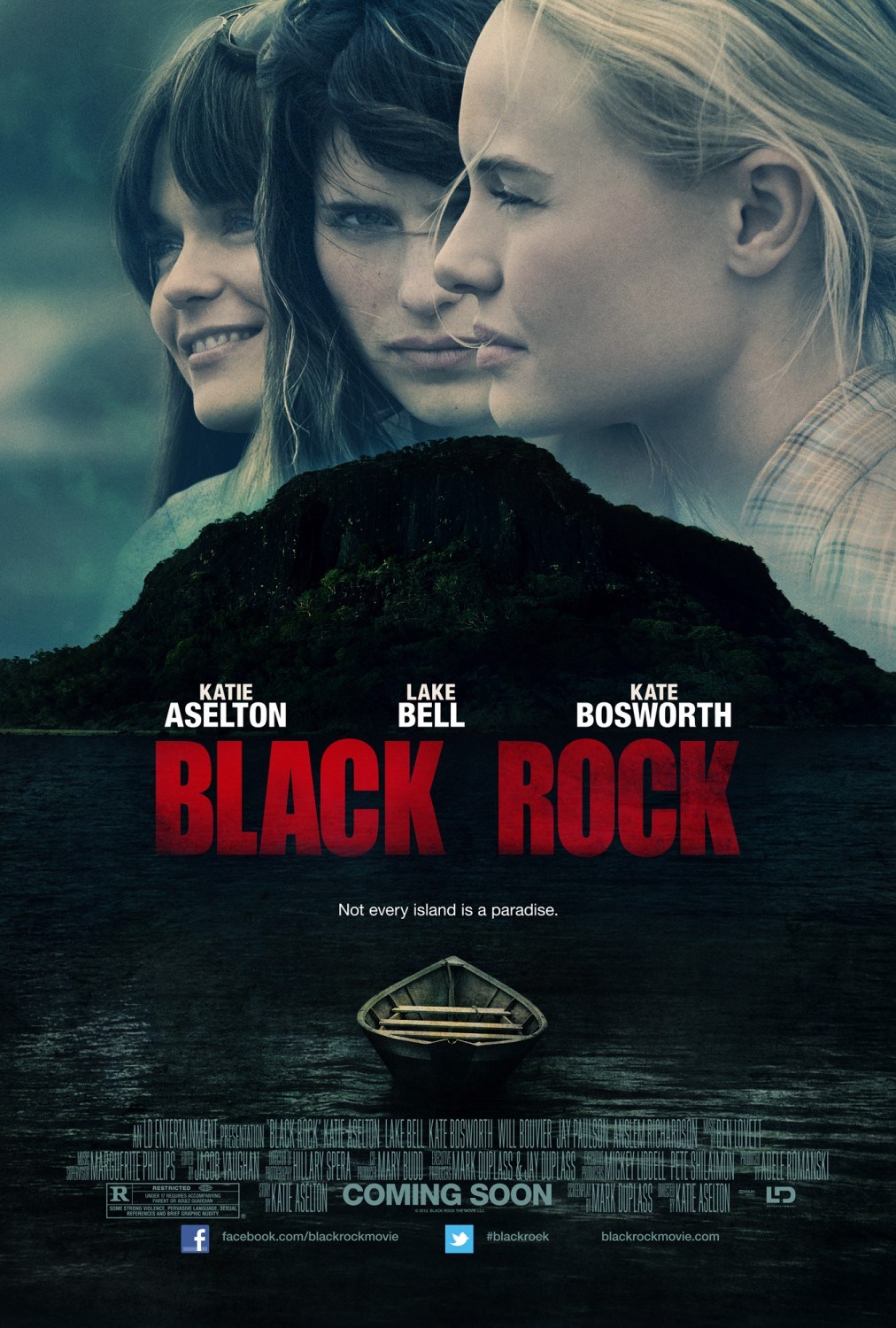 Black Rock
Directed by: Katie Aselton
Cast: Katie Aselton, Lake Bell, Kate Bosworth
Running Time: 1 hr 23 mins
Rating: R
Release Date: May 17, 2013 (VOD)
Black Rock
Directed by: Katie Aselton
Cast: Katie Aselton, Lake Bell, Kate Bosworth
Running Time: 1 hr 23 mins
Rating: R
Release Date: May 17, 2013 (VOD)
PLOT: A trip to a small island by three reunited friends (Aselton, Bell, Bosworth) turns into a moment of survival.
WHO'S IT FOR? If you think Katie Aselton is just Kevin's wife on "The League," you should definitely see this movie.
OVERALL
In the man's world that is moviemaking, Katie Aselton's name continues to rise on the list of interesting female filmmakers. Her directorial debut was The Freebie, where she acted opposite Dax Shepard in a couple's flirtation with a night of polyamory. She and on-screen husband Shepard decided to give each other one night before settling down in which they could do whatever they wanted, despite the fact that imagining the other with someone else brings great pain. Freebie has a hell of an ambiguous ending, and it certainly kicks fratty movies like Hall Pass right in the balls, presenting the emasculating nightmare of, "maybe she wants too fool around with someone else too, dude."
Now, Aselton has Black Rock, a thrilling indie that begins as an innocent reunion between three lady friends, and then becomes a nightmarish movie of survival. There is no hint of what lay ahead until it happens, instantly giving this movie a palpable realism, while also elevating it beyond simple genre fare. The third act is especially terrific for the chaos it reigns on screen with a small cast and a limited location.
Black Rock plays very well even as a simple horror movie, if you want to underestimate it like that. The greatness of Aselton's film is that it goes to even deeper, more intense, and more immediate levels - it becomes a gnarly B-movie about gender survival.
In a simplified comparison, Black Rock is indeed like a movie such as Death Proof, and shares qualities with those films that influenced Tarantino's own take. But, in terms of aesthetic presentation, this movie is well-behaved. It has the raw direction that one would expect from a grindhouse movie, but feels no need to be a drooling homage to the similar films before it.
The same can be said for how this movie shows women, which is not like they are masculine women, or like pretty women ready to be objectified. These women are simply women. Keeping in mind these factors, Black Rock is the type of movie Tarantino might want to make, but he's too much of a teenage boy to ever make it. And I can assure you, no chick is wearing a f**king cheerleader costume in this movie.
The movie is a roar from the gut against what is described as "the male gaze," a very real theory brought to a larger discussion by Laura Mulvey. Essentially, the theory posits that media puts audiences constantly in the point of view of a heterosexual male, which leads to the objectification of women and entitles men with a sense of superiority. Even when women are behind the camera, they see women in the same regard, whether such impressions are conscious or not. (For example, even the incredibly wise Sarah Polley, who made this weekend's wonderful; Stories We Tell, conceded at a Q&A for the film that she hadn't even noticed her lead female characters are defined by their relationships with their male partners, as pointed out by an older woman in her audience.)
With this being said, the greatness of Black Rock is that Aselton is so in control of how her women are presented, and doesn't fall for any guilt or objectification through her story. When a woman wants to fool around despite being involved with someone else, the film does not punish her, or think that she is wrong; it is what she chooses to do. At the same time, while making the film clear as to the opposing forces of male vs. female, it doesn't rely on a divisive categorization. Black Rock is a rare film in which women are equally as human as men.
As the horror of the movie continues to build, Black Rock takes on a primal nature. A moment of nakedness with characters, using two actresses who could easily be considered beautiful, is too awesomely raw to be sexualized. Instead, here are women that are indeed women, and they have a right to be naked without it turning into an event that caters to preferable angles, good lighting, or others. (That being said, if you're taking a trip to Black Rock for the aforementioned nudity, you are pathetically mistaken.)
The wild card of Black Rock is Mark Duplass, who happens to be Aselton's husband. I use the phrase "wild card" because Duplass' involvement certainly challenges any inclination to assume such a story was scripted by a woman. Duplass' involvement brings up many questions as well, regarding the concept of male gaze in the original screenplay, and also the difference a female director makes to a script written by a male. Is Duplass' involvement an indication of respectful harmony between genders, where he simply wrote these female characters as human beings? Or, did Aselton have to whip this script into its sharp shape to make it the aggressive expression it is?
Black Rock is a badass movie, both with its raw presentation of survival, and as a force against the rampant automatic objectification of women across genre and media. Most importantly, the film is badass in a way that can't be mistaken for masculine. Black Rock points a shotgun in the face of the male gaze, and pulls the trigger.
FINAL SCORE: 8/10
